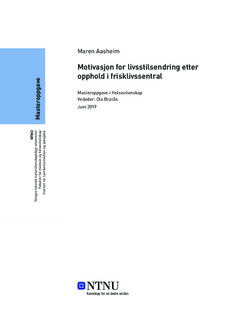| dc.contributor.advisor | Bratås, Ola | |
| dc.contributor.author | Aasheim, Maren | |
| dc.date.accessioned | 2019-09-26T14:05:56Z | |
| dc.date.available | 2019-09-26T14:05:56Z | |
| dc.date.issued | 2019 | |
| dc.identifier.uri | http://hdl.handle.net/11250/2619045 | |
| dc.description.abstract | Bakgrunn: Dagens samfunn står overfor et betydelig folkehelseproblem med utvikling av sykdommer som er knyttet til fysisk inaktivitet, usunt kosthold og tobakksbruk. Frisklivssentraler kan være et bidrag til å løse disse utfordringene. En frisklivssentral skal fremme helse og forebygge sykdom, ved å gi tidlig hjelp til å mestre helseutfordringer og endre levevaner.
Formål: Formålet med dette forskningsprosjektet er å få en nærmere forståelse av hva som motiverer til livsstilsendring etter avsluttet frisklivsresept ved kommunale frisklivssentraler. Målet er å finne ut hva som motiverer til videre livsstilsendring etter avsluttet frisklivsresept.
Metode: Det er benyttet kvalitativ metode med en fenomenologisk tilnærming for å utvikle kunnskap om informantenes erfaringer og opplevelser knyttet til hvilken motivasjon de har for videre livsstilsendring etter avsluttet frisklivsresept. Det ble gjennomført åtte individuelle intervjuer fra tidligere deltakere av frisklivsresept fra to frisklivssentraler i Sør- Norge. Intervjuene ble analysert ved hjelp av Malteruds systematisk tekstkondensering, som er inspirert av Giorgis psykologiske fenomenologiske analysemetode.
Resultat: Studiens funn viser at det er flere mulige motivasjonsfaktorer som bidrar til at deltakerne fortsetter med livsstilsendring etter avsluttet frisklivsresept. Etter avsluttet reseptperiode på frisklivssentralen, fikk deltakerne inspirasjon til å bli mer aktive, fant aktiviteter som var av interesse, samt at aktivitetene hadde gitt en opplevelse av glede. En av hovedgrunnene til at motivasjonen for livsstilsendring vedvarte var at deltakerne hadde fått bedre livskvalitet og helse. Sosial støtte og tilhørighet i forbindelse med livsstilsendring er også en viktig forutsetning for den videre motivasjonen.
Konklusjon: Funnene i denne studien har bidratt til en ny forståelse og kunnskap av hva som motiverer til videre livsstilsendring etter avsluttet frisklivsresept ved kommunale frisklivssentraler. Det trengs mer forskning på feltet, både kvalitativ og kvantitativ slik at vi kan få en bedre forståelse av hva som faktisk motiverer til livsstilsendring, og om denne livsstilsendringen er vedvarende.
Nøkkelord: Frisklivssentral, livsstilsendring, folkehelse, motivasjon, fysisk aktivitet, salutogenese, empowerment | |
| dc.description.abstract | Background: Today's society is facing a significant public health problem with the development of diseases that are related to physical inactivity, unhealthy diet and tobacco use. Healthy Lifestyle Centre (Frisklivssentral) can be a contribution to solve these challenges. A Healthy Lifestyle Centre aims to promote health and prevent disease by providing early help to people to manage their health challenges and changing their lifestyle.
Purpose: The purpose of this study is to get a closer understanding of what motivates lifestyle change after completing lifestyle prescription at municipal Healthy Lifestyle Centers. The aim is to find out what motivates to further lifestyle changes after participation of a lifestyle prescription.
Methods: A qualitative method has been used with a phenomenological approach to develop knowledge about the informants' experiences related to the motivation they have for further lifestyle change after participation of a lifestyle prescription. Interviews were conducted from eight previous participants of lifestyle prescription from two Healthy Lifestyle Centers in Southern Norway. The interviews were analyzed by using Malterud's systematic text condensation, which is inspired by Giorgi's psychological phenomenological analysis method.
Results: The findings of the study show that there are several possible motivational factors that contribute the participants to continuing their lifestyle changes after participation in a lifestyle prescription. After participation in a lifestyle prescription at the Healthy Lifestyle Centre, the participants got inspired to become more active, found activities that were of interest, and the activities provided an experience of joy. One of the main reasons why the motivation for lifestyle change persisted, was because the participants had improved their quality of life and health. Social support and belonging in connection with lifestyle change are also an important prerequisite for further motivation.
Conclusion: The findings in this study have contributed to a new understanding and knowledge of what motivates to further lifestyle change after participation in a lifestyle prescription at a Healthy Lifestyle Centre. More research is needed in the field, both qualitatively and quantitatively, so we can get a better understanding of what motivates to lifestyle changes, and whether this lifestyle change is persistent.
Keywords: Healthy Lifestyle Centre, lifestyle change, public health, motivation, physical activity, salutogenesis, empowerment | |
| dc.language | nob | |
| dc.publisher | NTNU | |
| dc.title | Motivasjon for livsstilsendring etter opphold i frisklivssentral | |
| dc.type | Master thesis | |
